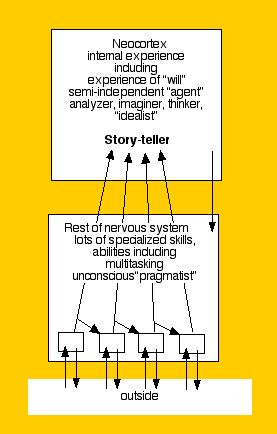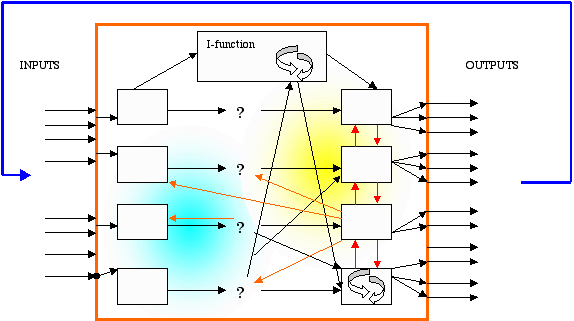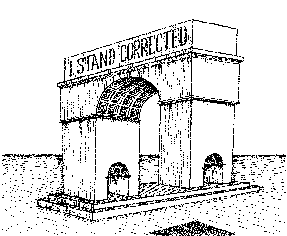Serendip is an independent site partnering with faculty at multiple colleges and universities around the world. Happy exploring!
Brain Behavior Institute - Session 15
 |
BRAIN AND BEHAVIOR INSTITUTE 2008 |

|
Generalized Control Mechanisms:
Mood, Emotion, Creativity, Self
Review and extension
Sensory experience is constructed, observations are themselves stories, best guesses based on ambiguous input which may have conflicting elements, require continual testing and revision

The discussion this morning gives me an impression that I will be a different teacher when I get back to school in September. The way I am looking at it, I will not approach my students' behaviors the way I used to because now I know better that they may not see what I think they are seeing ... Tola
could it be said that students see the same problem and explore different ways of solving that same problem? ... Bernadine
Reality is an issue. I understand the story but ... my cognitive unconscious has constructed a story that my reality is not the same as yours but mine is probably more right. This is real to me. This is what I think my students bring to the classroom, that their reality of what they perceive, feel, see, and taste is the only true reality ... Judith
The conflict arises when two realities (our students and ours) are in conflict. If there is going to be any meaningful and productive outcome from all our efforts for the school year, both realities according to Judith must gravitate towards a consensus. Anything contrary to this will be disastrous ... Tunde
reality is an hallucination ... Wil, Paul
As long as the cognitive unconscious makes an informed guess about
what's out there then the I-Function doesn't have to come into play.
If the cognitive unconscious makes an unwise decision then the
I-function has to step up to the plate to help balance it. I have 33
students who realities I must take into account and make allowances for
and adapt my teaching accordingly ... Seta
We were shown this morning that some behavior exhibited by students may not be under their conscious control. This leads us to not say to a student, "How can you not know what you did?!" It very well might be that the action was done by the cognitive unconscious without the knowledge or control by the student's "I-function." It forces me as the teacher to approach control and discipline from a totally different angle. It remains to be seen how well I will be able to develop and employ new techniques to address this new understanding. I guess this will be one of the areas I'll be reporting on during the year ... Alan
Connecting to student learning, we know that students shuffle into our classrooms with only their cognitive unconscious in operation. Like Tunde they will immediately respond to a set of operational behaviors.
Get out notebook…copy anything on the whiteboard…raise hand…say usual responses…etc.
Knowing the behavior of the cognitive unconscious how can teachers both wake up students’ I-Function and initiate student learning? ... Joyce
The need for self reflection as one teaches is an vital component of making meaning out of what we perrcieve in our students behavior. Finding time for this is important. So too is making time for sharing perspectives with other teachers. The notion that we can always get it less wrong is freeing ... Grace
One thing is that it will be difficult for teachers who have not been part of this institute to make sense of what we have done here. It will take time and evidence {seeing it work in my class} for them to believe ... Together we will be getting it less wrong. ... Tola
Can we teach kids to be better story tellers, to come up with better stories? I know the answer must be yes ... Carol
Blind sight - further evidence that the I-function/story teller is associated with neocortex (one can take in/use input without being aware of it)
The "crack" in the bipartite brain as a source of creativity, ability to conceive what hasn't been experienced
Generalized control mechanisms

- Mood, emotion important/valuable/bipartite, significant aspect of human diversity
- Creativity important/valuable/bipartite, particularly if science is as much conceiving what might be as revealing what is
- The story of the frog: "Intrinsic Variability"
- gambling
- trying things out
- interpersonal interaction, evolution

- Creativity with the I-function
- The story of the frog: "Intrinsic Variability"
- General states - pharmacology, semi-autonomy from environment/I-function
- Mood as additional observations/perspectives, a good thing (see "medical vs neurobiological model" of mental health; relevance to education?)
- Dreams as additional observations/perspectives
- Creativity as bipartite: unconscious and thoughtful
- Story telling as way of making sense of cacaophonous unconscious
- Feeling/emotion/intuition as important part of thinking
- Science as dependent on thinking/feeling/creating
- Impact of thinking/story telling on the unconscious
- Self as story



Comments
scientific story telling, reflective learning
From yesterday's session, a few notes for myself and anyone else interested ...
How does one adjudicate among "scientific" stories?
There is a need to distinguish between "learning" and "reflective learning." One goes on all the time, without any particular need to encourage it or have schools for it. And it should be given more attention in schools. It is reflective learning that, perhaps?, needs schools. Make the difference clearer? Further consider its implications?
feelings? emotions?
I want to know how to think about feelings and emotions, in the framework we have been developing this week and last. What is it when I feel sad, happy, frightened, etc.? And where is it? I know I should be able to use my understanding of the cognitive unconscious, the I function and the storyteller to understand 'feelings', but I am having some trouble 'telling' this story.
Someone sent me a link to a talk by Jeff Hawkins on YouTube about his 'theory' of how the brain works. http://www.youtube.com/watch?v=G6CVj5IQkzk It's pretty interesting, though this talk is a few years old. I was trying to read his book, On Intelligence, but I think this is probably a quick summary of his ideas. He talks about intelligence as defined by prediction, based on the brain's observing patterns, storing memories and making predictions. Sounds similar to what we've been talking about here.
On another note, I've searching to try to remember the name and author of a novel I read about a nun who experiences intense mystical visions, which she then eloquently writes about, who learns that the visions are likely caused by temporal lobe epilepsy. She then needs to decide whether to treat the epilepsy and lose her visions and her writing. It's called Lying Awake by Mark Saltzman, and , as a review says, it " probes the nature of spiritual illumination and the meaning and purpose of prayer in everyday life; and, at bottom, there lurks a profound meditation on the mystery of artistic inspiration." A very powerful read.
Teaching to both . . .
. . . or teaching the whole child. This institute has really been giving me food for thought. In order to reach my charges, it is becoming more evident that I have to find a way to involve the "cognitive unconscious" as well as the "I-function." We have to break through to the "CU." Now I'm beginning to wonder if we really need the "I-f" at all. If we can instill the material in the CU, isn't that enough? Will the child even know (s)he has the info when questionned? Or will it only come out when the application of the knowledge is needed? Ideally, we should be able to retrieve it under both circumstances.
All of us here are striving to learn more effective ways to "engage" our students in their own learning -- to get them to want to learn. This can go back to the idea that "First, we have to get their attention." We science people can do this (sometimes) with "whiz-bang" demos (like: http://exploscience.com/Book.html or any book by Shakashiri). What I am always looking for are other ways to do the same thing . . . or to reach the same goal by coming at them from a totally different angle.
So, we have to activate prior knowledge or get them involved in some goal-oriented activity (like Joyce's "periodic table game building") in order to cause them to need the knowledge we want them to acquire. To reach their goal they will need to use our material, thereby reaching our goal.
Project-Based Models
Yes, Alan I am in agreement with your thinking process! I actually have focused on this most important connection to be my work for this summer. Although I know from experience that Project based models are fantastic to initiate students’ development of deep understanding I am newly charged with aligning the pieces within the project that correspond to individual student success. I know that students will produce a product that is very different from the original science content that was offered within my class. I can examine their perception of the content based on the product as well. The really excellent part is that I can now continue to “web out” the project’s ancillary components. I will align them with brain constructive processes in an extremely thoughtful manner that targets necessary features for teen brains.
I am very excited about this approach and will happily work on it during the summer. In addition this gives me new information that explains the methodology to administrators and parents. In particular, it justifies what I thought was a downfall but now see as constructive rather than subjective assessment.
I am matching what I currently have in my projects to necessary brain engagement as well as sparking meaningful constructions. I will attach my Periodic Table Game Project (about 14 pages) in my blog as well as the connections within the project to my constructions gathered in The B&B Institute.Identity and Self
Is it true that one is in 3 parts: Me, Myself and I? Considering the fact that the I-Function and the Cognitive-Unconscious are both operating individually but cooperatively, one can get to resolve any conflict in their relationship to create a different experience.
I was almost confused until we got to discuss that the conflicts between the I-Function and Cognitive-Unconscious can be resolved.
Relating this to my students, it means their cognitive unconscious can be tamed by resolving such conflicts. They come in everyday doing things from the cognitive unconscious whereas in their I-Function is something very much different. Since it is possible to combine both the I-Function and Cognitive-Unconscious, then as an educator I need to be able to find ways of resolving this conflict.
Reflection - Sleeping
The body has a sleep cycle that needs to be adhered to in order for the cognitive unconscious to function properly. Usually if I have a student who doesn’t get enough sleep, I find them to be cranky, unable to think, they have a hard time following directions, and work that is normally easy becomes difficult for them. In order for the brain to resort stories and solve problems it must be able to sleep.
I have often been a
Sleep deprived students
Generalized control mechanisms
Morning Session Generalized Control Mechanisms
Talking about the internal
Talking about the internal clock as Paul illustrated with the human in a cage without any idea of what time would be and without a clock or watch, every body is different but we all run a daily shift that is as close to 24-hours as possible.
In other words, I will like to believe that our students also have their own individual internal clocks as you mentioned. The only thing is that their clocks tick at different times. Those individual ticks may not be wrong or right. Each is just uniquely timed.
What we can do to address this in our society is to educate the community on the concept of individuality and children's readiness for various activities.
Dreaming
We are a story
As Paul said, “our conscious identity is a story. “ The story that the conscious identity is a story is actually and old story. Here it is told through a Buddhist lens:
When the Buddha confronted the question of identity on the night of his enlightenment, he came to the radical discovery that we do not exist as separate beings. He saw into the human tendency to identify with a limited sense of existence and discovered that this belief in an individual small self is a root illusion that causes suffering and removes us from the freedom and mystery of life. He described this as interdependent arising, the cyclical process of consciousness creating identity by entering form, responding to contact of the senses, then attaching to certain forms, feelings, desires, images, and actions to create a sense of self. In teaching, the Buddha never spoke of humans as persons existing in some fixed or static way. Instead, he described us as a collection of five changing processes: the processes of the physical body, of feelings, of perceptions, of responses, and of the flow of consciousness that experiences them all. Our sense of self arises whenever we grasp at or identify with these patterns. The process of identification, of selecting patterns to call "I," "me," "myself," is subtle and usually hidden from our awareness.
-Jack Kornfield, A Path with Heart
I think it is interesting to
Abuse of Power
There is also the whole question of the special status of teacher, just like there is that of the boss, when considering the question of sexual abuse. But that may lead to an entirely different discussion . . . .
Generalized control mechanisms
Post new comment